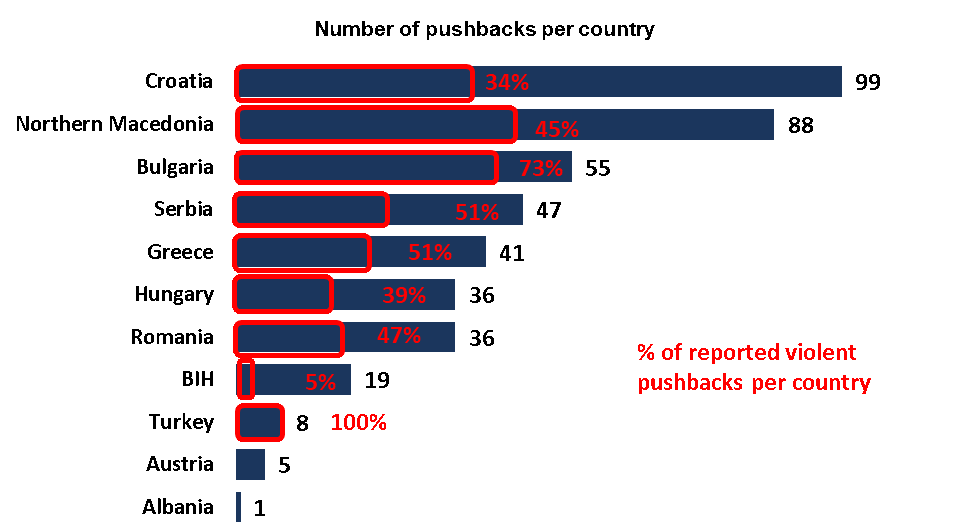 Sjeverozapadni Balkan
Sjeverozapadni Balkan
Jezici
Reports about pushbacks and violence against children at the Western Balkans borders in 2019 and 2018
In 2019 an outreach team providing support to refugee and migrant children and their families arriving in Serbia encountered and serviced 4,377 refugee and migrant children in Belgrade, both those traveling alone as well as those accompanied by their family members.[1]More than a third these of these minors (35% or 396) reported being pushed back across the borders of the European Union countries and countries in the Western Balkans region during their journey.
Almost half of all children reporting pushbacks (44%) also reported experiencing violence or directly testifying to it while being pushed back. Children testified about border guards using pepper sprays, taking away their phones and breaking them, stealing their money and other belongings, forcing them to remove clothes and shoes, setting dogs on them, beating them or people they travel with using hands and batons, and using weapon to threaten them. Children and families also reported being, in some cases, held in detention without food or water.
Large majority of children experiencing pushbacks were unaccompanied and separated children (85% of push back cases), who are among the most vulnerable groups in the refugee and migrant population. Almost half of the pushbacks of UASC involved violence (46%). The majority of the children travelling alone who were irregularly returned from the borders, 77% of them, were boys from Afghanistan.
In every fifth case (18%), children involved were younger than 13. Out of the pushback cases in which the border guards used excessive violence against children or with children being present and witnessing the violence, 29% cases involved children younger than 13.
In 2019, 9 girls travelling alone reported being pushed back. The violence was reported in 3 cases.
Most of the children reporting pushbacks came from Afghanistan (85%), followed by children from Iraq (5%) and Pakistan (4%). This does not surprise having in mind that Afghan children were the most numerous in population of minors transiting through Serbia in 2019.
Most of the reported pushbacks of children occurred at Croatian (99), Northern Macedonian (88), Bulgarian (55), Serbian (47), Greek (41), Hungarian (36) and Romanian (36) borders. The frequency of the violent pushbacks does not follow the same order. Out of all pushback reported at the Bulgarian borders, 73% were violent. At at the borders of Greece and Serbia, 51%, cases involved violence, 47% at the borders of Romania, and 45% at the borders of Northern Macedonia.

In 2019, adult beneficiaries, 10,746 of them, testified about 7,688 cases of pushbacks, out of which 3,038 (40%) were violent.
In 2018 and 2019, testimonies about 3,217 cases of pushbacks of children across the borders were collected, out of which over 40% (1,321) were violent. Over half of the cases of the pushbacks involved unaccompanied and separated children (2,530).
The reports about pushbacks were collected by the outreach team run by Save the Children and local partner Praxis, that operated in Serbian capital Belgrade, one of the main transit points on the Western Balkans Route.
[1] All figures used in this text refer to the testimonies of the beneficiaries of our outreach team. Although the figures are not fully representative of all refugees and migrants transiting through the Western Balkans Route, they are very useful and illustrative when it comes to the structure of population being pushed back and the frequency of the pushbacks at the route. Since one person can testify to several pushbacks, the number of the pushback cases is somewhat bigger than the number of children reporting/experiencing them. Unaccompanied minors made the majority of the children serviced by our outreach team.